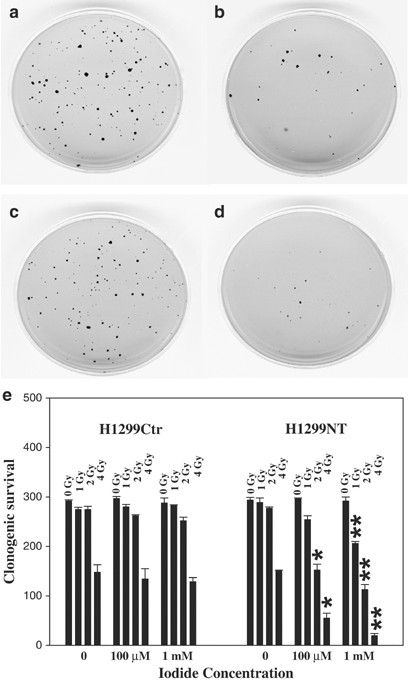Play all audios:
While external ionizing radiation has been used for treating non-small cell lung cancer (NSCLC), improved efficacy of this modality would be an important advance. Ectopic expression of the
sodium iodide symporter (NIS) and thyroperoxidase (TPO) genes in NSCLC cells facilitated concentration of iodide in NSCLC cells, which markedly induced apoptosis in vitro and in vivo.
Pre-incubation of the NIS/TPO-modified NSCLC cells in iodide followed by ionizing radiation generates bystander tumoricidal effects and potently enhances tumor cell killing. This
iodide-induced bystander effect is associated with enhanced gap junction intercellular communication (GJIC) activity and increased connexin-43 (Cx43) expression. Thus, iodide may serve as an
enhancer to markedly improve the efficacy of radiation therapy in combined therapeutic modalities.
This work is supported by The UCLA SPORE in Lung Cancer, National Institutes of Health P50 CA90388, R01 CA085686 (SMD), Medical Research Funds from the Department of Veteran Affairs, and the
Tobacco-Related Disease Research Program of the University of California.
Division of Pulmonary and Critical Care Medicine, David Geffen School of Medicine at UCLA and Veterans Affairs Greater Los Angeles Healthcare System, CA, USA
Division of Endocrinology and Metabolism, Department of Medicine, David Geffen School of Medicine at UCLA and Veterans Affairs Greater Los Angeles Healthcare System, CA, USA
Lung Cancer Research Program of the Jonsson Comprehensive Cancer Center, David Geffen School of Medicine at UCLA and Veterans Affairs Greater Los Angeles Healthcare System, CA, USA
Department of Pathology, David Geffen School of Medicine at UCLA and Veterans Affairs Greater Los Angeles Healthcare System, CA, USA
Anyone you share the following link with will be able to read this content:

